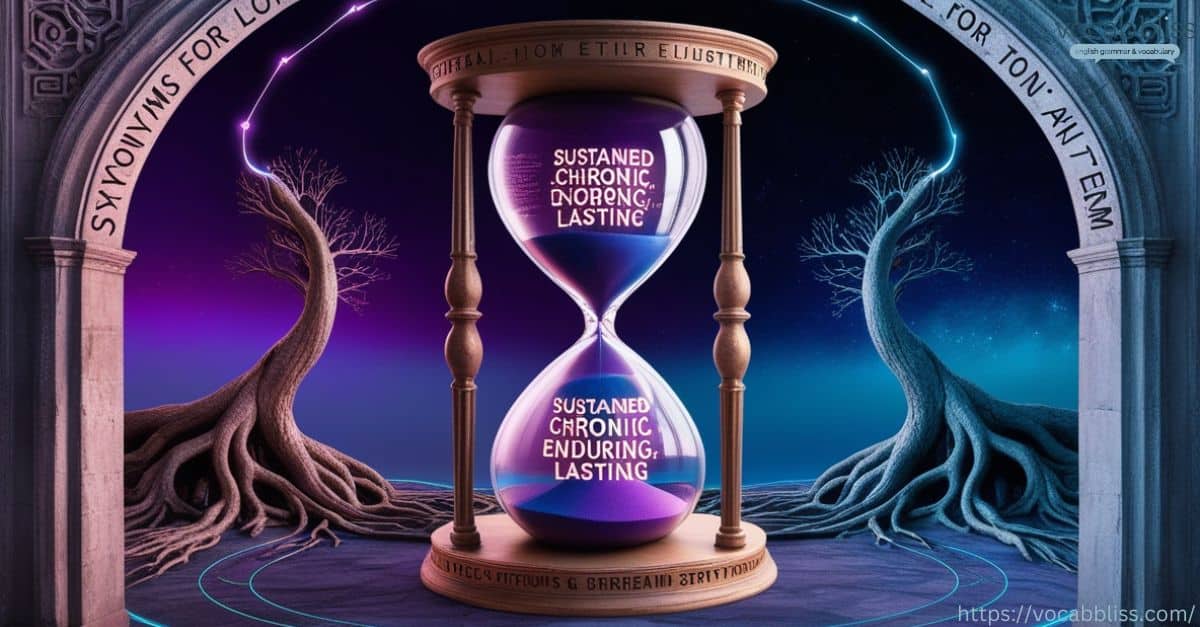Writing often confuses writers about whether to use “long term or long-term.” Does it need a hyphen? When should one serve as a noun phrase and the other as an adjective?
This guide will clear up the confusion and ensure you understand the correct grammatical usage, the style guides’ recommendations, and how to apply these terms in various contexts, such as professional writing and documentation.
Why Is There Confusion?
The confusion between “long term” and “long-term” stems from their usage and grammatical function. Both terms relate to an extended period or an action lasting for a prolonged duration, but each serves a distinct role in a sentence.
- “Long term” without a hyphen acts as a noun phrase, meaning a period lasting a considerable length of time.
- “Long-term” with a hyphen functions as a compound adjective, modifying a noun to describe something that extends over a long duration.
Writers often mix these up because both refer to duration and may appear interchangeable at first glance. However, knowing their grammatical usage is essential for clarity and professionalism in writing.
⚡ Quick Summary
When deciding between “long term” and “long-term,” it’s essential to understand their grammatical functions:
- “Long term” (without a hyphen) acts as a noun phrase and refers to a period of time. Example: “Planning for the long term is important.”
- “Long-term” (with a hyphen) functions as a compound adjective that describes a noun. Example: “They made a long-term commitment.”
Key guidelines:
- Use “long term” when referring to the time period itself.
- Use “long-term” when modifying a noun.
- Always apply the hyphen in compound adjectives for clarity.

Understanding the correct usage of these forms helps maintain professional writing standards and ensures clarity in communication.
Continue reading: Requester or Requestor: Which Spelling to Use?
What Does “Long Term” (with space) Mean?
“Long term,” in fact, is a noun phrase that stands independently in a sentence. Specifically, it refers to a significant, sustained period.
Definition: In grammar, a noun phrase is a group of words that functions as a noun. “Long term” fits this description when it refers to the concept of time itself.
Example in context:
- “Planning for the long term is essential for sustainable business growth.”
- “Her investments are focused on returns in the long term.”
Usage tips:
- Use “long term” when referring to the time period directly.
- Ensure it is not modifying a noun to avoid grammatical errors.
Synonyms for “long term”:
- Extended period
- Duration
- Prolonged timeframe
What Does “Long-Term” (Hyphenated) Mean?
“Long-term” is a compound adjective used to modify nouns. When describing a noun that requires a hyphenated modifier, “long-term” is the right choice.
Definition:A compound adjective, in essence, combines two or more words to function as a single modifier for a noun. Moreover, these combined words work together to provide a clearer or more specific description of the noun they modify.
For example, phrases like “well-known author” or “high-speed train” use compound adjectives to enhance meaning. As a result, they improve the readability and precision of sentences.
Example in context:
- “The company is looking for long-term solutions to its financial issues.”
- “They developed a long-term strategy for policy implementation.”
Why the hyphen?
The hyphen connects “long” and “term,” showing that they work together to describe the following noun. Without it, the sentence might read ambiguously or lead to confusion.
Synonyms for “long-term”:

- Sustained
- Chronic
- Enduring
- Lasting
“LongTerm or Long-Term”: The Differences
Understanding the differences between “longterm or long-term” is essential for precise and professional writing. While both forms relate to a prolonged duration, their grammatical roles determine how they should be used.
- “Long term” functions as a noun phrase, referring to an extended period or timeframe without modifying another word. It is commonly used when discussing time as an independent concept. For example, “Investing for the long term is crucial for financial stability” uses “long term” as the object of the preposition “for,” illustrating that the term stands on its own.
- “Long-term” acts as a compound adjective. This hyphenated form modifies a noun, indicating that the noun has the quality of lasting over a significant period. For instance, “She developed a long-term strategy” shows that the strategy is designed to extend over an extended timeframe. The hyphen connects “long” and “term,” ensuring the reader understands that these two words function as a single descriptor.
Key Grammar Distinctions:
- Noun Phrases: Phrases like “long term” stand alone and are not hyphenated. They can be the subject or object of a sentence, emphasizing the idea of a lengthy duration without describing another noun.
- Compound Adjectives: When “long” and “term” combine to describe a noun, they form a compound adjective and should hyphenate to maintain clarity and prevent misreading.
Here’s an expanded chart for easy comparison:
| Aspect | “Long Term” (Noun Phrase) | “Long-Term” (Adjective) |
|---|---|---|
| Grammar Function | Noun phrase | Compound adjective |
| Role in Sentence | Acts as the subject or object | Modifies a noun |
| Example Sentence | “Investing for the long term is crucial.” | “She developed a long-term strategy.” |
| Hyphenation Rule | Not hyphenated | Hyphenated |
| Common Uses | Financial planning, career goals, policy | Describing plans, solutions, investments |
| Synonyms | Duration, future period | Sustained, chronic, prolonged |
Usage Tips:
- Always use “long term” without a hyphen when referring to the concept of time itself, such as “The project aims to yield results in the long term.”
- Use “long-term” with a hyphen when it precedes and modifies a noun, like in “long-term care” or “long-term benefits.”
Applying these rules will ensure your writing is both grammatically accurate and professional, aligning with standard English conventions and promoting clarity in communication.
“Long Term” as a Noun Phrase
Use “long term” as a noun phrase when it refers to the concept of a duration directly.
Example:
- “He plans for the long term, not just immediate gains.”

“Long-Term” as an Adjective
Use “long-term” as an adjective when describing a noun.
Example:
- “Their long-term project aims to reform the education system.”
Is Long Term Hyphenated?
Is “long term” hyphenated? This is a common query among writers. The simple answer is: it depends on its grammatical function.
- Noun phrase (no hyphen): “She is thinking in the long term.”
- Adjective (hyphenated): “They established a long-term partnership.”
Rule of thumb:
If it’s an adjective describing a noun, always use the hyphen. Without a noun, it should remain unhyphenated as a noun phrase.
Synonyms For “Long Term or Long-Term”
When writing, it’s often helpful to use synonyms to avoid repetition and enrich the content. Additionally, both “long term” and “long-term” have various alternatives that not only maintain their meanings but also offer greater flexibility in expression. Furthermore, these synonyms can help add variety and depth, making the writing more engaging for the reader. The choice of synonyms depends on the grammatical role—whether as a noun phrase or an adjective.
Synonyms for “Long Term” (Noun Phrase)
When you use “long term” as a noun phrase, it signifies an extended duration or period. Here are some effective synonyms you can use interchangeably in writing:
- Extended period: Highlights a significant span of time without an end in sight. Example: “The benefits will be noticeable over an extended period.”
- Duration: Suggests a measurable span, often used in more formal contexts. Example: “The project’s success is measured over a long duration.”
- Future period: Emphasizes planning or consequences expected in time to come. Example: “Policies are set with a focus on the future period.”
- Enduring phase: Conveys stability and ongoing nature. Example: “Economic growth is anticipated over an enduring phase.”
- Prolonged timeframe: Implies a longer-than-average period. Example: “Recovery will take a prolonged timeframe.”
Table of Synonyms for “Long Term” (Noun Phrase):
| Original | Synonym | Example |
|---|---|---|
| Long term | Extended period | “An extended period is needed for results.” |
| Duration | “The duration of the study spans years.” | |
| Future period | “The strategy targets a future period of growth.” | |
| Enduring phase | “An enduring phase of stability is crucial.” | |
| Prolonged timeframe | “Expect a prolonged timeframe for completion.” |
Synonyms for “Long-Term” (Adjective)
The hyphenated “long-term” functions as an adjective, as it modifies nouns by describing their sustained or lasting qualities. Consequently, this helps convey the idea of duration clearly and effectively.. Additionally, here are some synonyms that can replace “long-term” in various contexts:
- Sustained:It indicates ongoing or continuous characteristics. For example, “They have a sustained growth strategy.”
- Chronic: Often used in medical or economic contexts to show persistence. Example: “Chronic conditions require careful, long-term care.”
- Enduring: Emphasizes the lasting nature of something. Example: “Enduring solutions are necessary for climate change.”
- Protracted: Suggests something extended over time, often with a sense of delay. Example: “Protracted negotiations finally bore fruit.”
- Lasting: Denotes permanence or long-lasting effects. Example: “Investments should provide lasting benefits.”
Table of Synonyms for “Long-Term” (Adjective):
| Original | Synonym | Example |
|---|---|---|
| Long-term | Sustained | “A sustained commitment is essential.” |
| Chronic | “Chronic issues need long-term solutions.” | |
| Enduring | “Enduring policies help stabilize the market.” | |
| Protracted | “The protracted conflict required long-term aid.” | |
| Lasting | “Lasting impacts were seen in community efforts.” |
These synonyms help add variety and depth to your writing while maintaining clarity and ensuring the text remains engaging. Properly selecting the right alternative based on context will not only keep your writing dynamic but also ensure it is tailored to the intended audience.
Examples in Context

To understand how to use “long term or long-term” correctly, seeing examples in context is essential. Furthermore, these examples clearly illustrate how the two forms function within sentences, thereby showcasing their proper usage and grammatical roles.
Examples Using “Long Term” (Noun Phrase)
When “long term” is used as a noun phrase, it refers to an extended period or timeframe and does not modify a noun. Here are some examples that show its use:
- “Investing for the long term is essential for building a secure financial future.”
This sentence uses “long term” as the object of the preposition “for,” referring to a future period without modifying a noun. - “The company’s focus on long term sustainability has set it apart in the industry.”
Here, “long term” serves as a noun phrase, emphasizing a broad timespan regarding sustainability. - “In the long term, these policies are expected to yield positive results.”
This example highlights “long term” as a standalone time reference. - “Healthcare plans should account for the benefits patients will receive in the long term.”
The phrase emphasizes the timeframe over which benefits are evaluated.
Examples Using “Long-Term” (Adjective)
The hyphenated “long-term” acts as an adjective that modifies a noun, indicating something lasting or enduring. Here are examples showcasing this use:
- “The board agreed to a long-term strategy to address the company’s growth.”
“Long-term” modifies “strategy,” showing that it spans an extended duration. - “They entered a long-term lease agreement for the office building.”
The adjective “long-term” describes the type of lease, indicating that it lasts for an extended period. - “Long-term planning is crucial for successful project management.”
In this sentence, “long-term” modifies “planning,” emphasizing the importance of sustained preparation. - “The project requires long-term investment to ensure its success.”
Here, “long-term” qualifies “investment,” indicating the need for funding over an extended period. - “Long-term relationships between businesses can lead to mutual growth.”
The adjective “long-term” describes “relationships,” highlighting their enduring nature.
Quick Tips for Contextual Use:
- Use “long term” without a hyphen when referring to time as a standalone concept.
- Apply “long-term” with a hyphen when modifying a noun to describe its lasting quality.
These examples effectively clarify how writers use “long term” and “long-term” in real sentences. By doing so, they help maintain accuracy and adhere to standard English grammar conventions.
Origins and Evolution of “Long Term vs Long-Term”
Origins of “Long Term”
The term “long term” has roots in the 19th-century English language. Initially, it appeared in economic and financial literature, referring to investments and strategies spanning a considerable period.
Historical use:
- In early economic policies, planners emphasized returns over the “long term,” ensuring that policies would sustain future growth.
Origins of “Long-Term”
The use of “long-term” as a compound adjective emerged alongside the development of more complex writing conventions. The inclusion of the hyphen was established to avoid ambiguity when describing nouns.
Practical Tips for Writers: When to Use “Long Term” or “Long-Term”
Understanding grammar rules is crucial for professional writing, but practical application is just as vital. Here are actionable tips:
Guidelines for choosing the right form:
- Use “long term” when referring to the period itself.
- Use “long-term” when describing a noun.
- Always check if your usage aligns with style guides like APA or Chicago Manual of Style.
Example sentences for practice:
- Incorrect: “This is a long term solution.”
- Correct: “This is a long-term solution.”
A Final Look at “Long Term” and “Long-Term”
Choosing between “long term” and “long-term” might seem minor, but it’s a detail that sets professional writing apart. By understanding the differences in grammar and usage, you can write with more clarity and precision. Remember:
- Use “long term” as a noun phrase without a hyphen.
- Use “long-term” as an adjective with a hyphen when modifying a noun.
Key takeaways:
- Ensure your sentence structure supports the correct form.
- Double-check for hyphenation in formal documents and business communications.
- Pay attention to how the term fits within the context, especially in fields like business, finance, and healthcare, where long-term strategies are common.
By mastering the use of “long term” and “long-term,” your writing will not only adhere to standard English conventions but also achieve greater clarity and professional quality.






